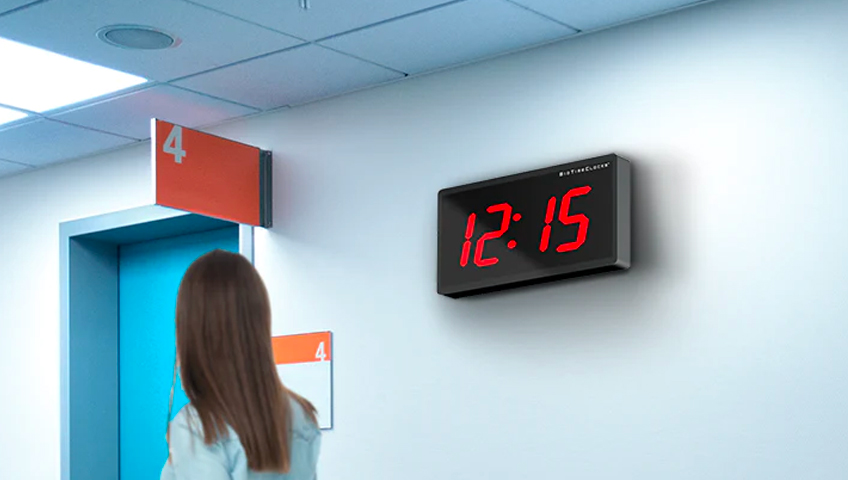The choice between electrical and battery-operated clocks depends on various factors, including the intended use, convenience, and the specific requirements of the application. Here are some considerations for both types:
Electrical Clocks:
Power Source:
- Direct Power Connection: Electrical clocks are typically connected directly to an electrical outlet. They don’t rely on batteries for power.
Consistent Power Supply:
- Steady Operation: Electrical clocks operate continuously as long as there is a power supply. They don’t require battery changes, providing a consistent and reliable timekeeping solution.
Installation Considerations:
- Location: Electrical clocks are suitable for permanent installations in locations where a power source is readily available, such as offices, schools, and indoor spaces.
Maintenance:
- Minimal Maintenance: Electrical clocks generally require minimal maintenance. They don’t have batteries that need periodic replacement.
Precision:
- Consistent Timekeeping: With a steady power source, electrical clocks can maintain precise timekeeping without the variations that may occur in battery-operated clocks.
Battery-Operated Clocks:
Power Source:
- Battery-Powered: Battery-operated clocks rely on batteries for power. This makes them portable and suitable for locations without easy access to electrical outlets.
Flexibility in Placement:
- Versatility: Battery-operated clocks can be placed in various locations, including areas where installing electrical wiring is impractical or not possible.
Ease of Installation:
- Simple Setup: Battery-operated clocks are easy to install, as they don’t require wiring or a power outlet. This makes them a convenient option for temporary setups or outdoor locations.
Independence from Power Outages:
- Operational During Outages: Battery-operated clocks remain functional during power outages, providing continuous timekeeping even when electrical clocks might be affected.
Maintenance:
- Battery Replacement: The main maintenance requirement for battery-operated clocks is periodic battery replacement. The frequency depends on the clock’s design and the type of batteries used.
Mobility:
- Portability: Battery-operated clocks are portable and can be easily moved from one location to another without the need for reinstallation.
Considerations for Both Types:
Initial Cost: The initial cost of electrical clocks may be higher due to installation requirements, while battery-operated clocks may have a lower upfront cost.
Battery Disposal: Battery-operated clocks contribute to battery waste, while electrical clocks, once installed, have a lower environmental impact.
Design Preferences: The choice between electrical and battery-operated clocks may also depend on design preferences, as each type comes in various styles and designs.
Ultimately, the decision between electrical and battery-operated clocks should be based on the specific needs of the application, the intended location, and the level of convenience required. Each type has its advantages, and the most suitable option depends on the context in which the clock will be used.
To grill with fuel or charcoal. To drive an electrical automobile or go for inner combustion. To eat oatmeal or Pop-Tarts for breakfast. In relation to deciding on an power supply for our every day wants, now we have extra choices now than ever.
These selections prolong to the fundamental operations of any giant facility, together with its clocks. While you’re deciding on clocks to your college, manufacturing unit, or medical facility, you will have two choices for an influence supply: electrical or battery-operated.
The fitting selection typically depends upon the assets at your disposal and the way you propose to deploy your clocks. Listed here are the professionals and cons of each battery and electrical clocks.
The Professionals of Battery-Operated Clocks
If ease of set up is your prime precedence, then battery-operated clocks are doubtless your best choice. With battery energy, you do not have to fuss with a tangle of wires behind a wall. Simply be certain that the clocks have recent batteries and inform the proper time, and also you’re all set.
If you happen to worth flexibility, battery-power brings additional advantages. Transferring a clock from one room to a different merely means taking it off the wall, with none wires to disconnect and reconnect.
This ease of set up interprets to {dollars} saved when it comes to labor, however battery clocks are additionally usually inexpensive to buy, enhancing the upfront monetary financial savings.
On prime of the financial advantages and comfort, battery-powered clocks are extra resilient than their wired counterparts in that they don’t seem to be affected by energy outages. That manner, you probably have a disaster to deal with, you possibly can not less than be assured everybody is aware of what time it’s.
The Cons of Battery-Operated Clocks
Whereas battery energy has loads going for it when it comes to ease-of-use, it does have its drawbacks.
The obvious shortfall is that batteries do not final without end. The time you save from set up may be negated by your obligation to routinely change the battery — as typically as as soon as per 12 months. That is likely to be a upkeep routine you like to not tackle, particularly when you selected battery energy as a result of you do not have the staffing vital to put in electrical clocks within the first place.
The Professionals of Electrical Clocks
If you choose electrical clocks to your facility, you will have to place in slightly extra effort on the entrance finish, however you will be extra doubtless sit again and calm down as soon as your clocks are up and operating.
In the long term, electrical clocks will provide appreciable time financial savings since you will by no means have to alter the batteries. Now, the time you’d have spent altering batteries may be put towards the next precedence job.
The Cons of Electrical Clocks
While electrical clocks have several advantages, they also come with certain drawbacks or cons. Here are some potential disadvantages of electrical clocks:
Dependency on Power Supply:
- Vulnerability to Power Outages: Electrical clocks rely on a continuous power supply. In the event of a power outage or disruption, the clock may stop working temporarily, leading to a loss of timekeeping accuracy.
Installation Limitations:
- Need for Electrical Outlets: Electrical clocks require access to electrical outlets. This can limit their installation to areas where wiring is available, potentially restricting placement options in certain environments.
Wiring and Installation Costs:
- Installation Expenses: Installing electrical clocks may involve additional costs related to wiring and electrical work. This can make them more expensive to set up initially compared to battery-operated clocks.
Location Constraints:
- Fixed Placement: Electrical clocks are typically installed in fixed locations due to their dependency on power sources. Moving them to different areas may require rewiring, which can be impractical.
Potential for Maintenance Issues:
- Sensitivity to Electrical Issues: Electrical clocks may be sensitive to fluctuations in electrical power. Surges or other electrical issues could potentially impact the clock’s performance, necessitating maintenance.
Environmental Considerations:
- Carbon Footprint: The continuous operation of electrical clocks contributes to electricity consumption. In comparison, battery-operated clocks may have a lower environmental impact, especially if they use rechargeable batteries.
Complexity of Repairs:
- Technical Repairs: When electrical clocks experience issues, repairs may require technical expertise. This can make troubleshooting and fixing problems more challenging compared to the simplicity of battery-operated clocks.
Limited Portability:
- Less Portable: Electrical clocks are less portable than battery-operated counterparts. Their fixed connection to power sources limits their mobility and flexibility in terms of placement.
Potential for Obsolescence:
- Technology Changes: As technology evolves, the specific components or systems used in electrical clocks may become outdated. This can lead to challenges in finding compatible replacement parts or support for older models.
Safety Concerns:
- Electrical Hazards: In certain environments, such as wet or outdoor spaces, there may be safety concerns related to using electrical clocks. Exposure to the elements or the risk of electrical hazards could be significant drawbacks.
It’s important to note that the cons mentioned above are general considerations and may vary based on the specific design, quality, and application of the electrical clock. When choosing between electrical and other types of clocks, it’s essential to assess the specific needs of the environment in which the clock will be used.







